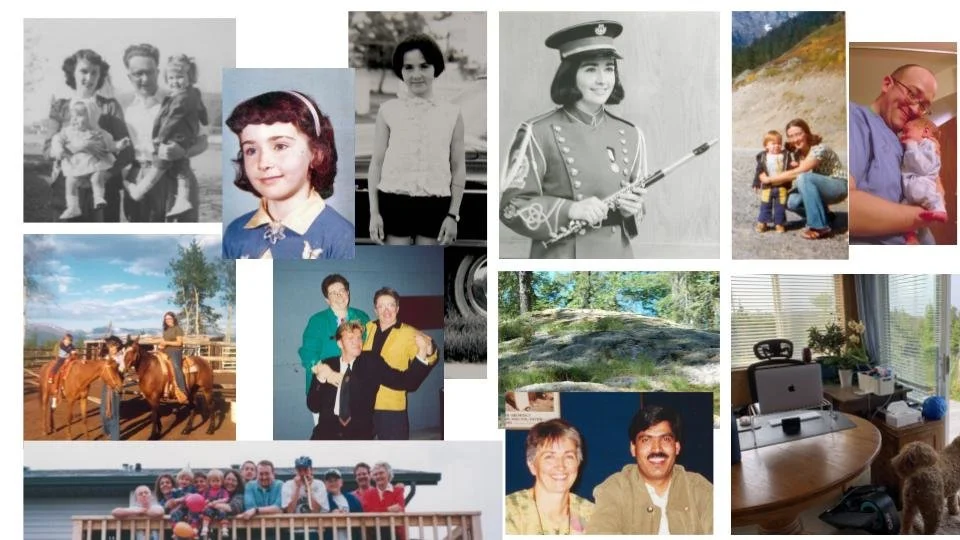What’s The Backstory?
Being in relationship and in community helps us shelter from the storms of life.
It is advanced practice to see each other as full human beings. Each of us has our own life and history, ideas, experiences, trauma background, social location, brain development, nervous system, mental health, and levels of joy, sadness, safety and meaning in life.
What do we really know about other people? If we knew some of their backstory, would we have more compassion and patience? We maintain our boundaries, and maybe we experiment with opening our heart. We look for some common ground.
Individual people are complex. Groups of us even more so! Start with your backstory.
I could tell you a story about my experience in each of these pictures, the people in them, what you might think my experience was based on the smile on my face and what was actually my experience (sometimes they match). These are just a few of the people and places who are part of my life.
Each person in the family photo was having their own experience the day that picture was taken. I loved that butterfly sweater in my grade 2 picture and the old woman across the street told me I looked like Elizabeth Taylor. I had a child and he has three. My glamorous sweet friend Donnie died of AIDS. I had a rustic cabin on a lake in western Canada, and now I have a tiny house at the ocean in Nova Scotia where I live alone with my dog Shantih and close to my son and family.
What’s your backstory?
If you have time this week, pull out some pictures and give it some thought. Is there a sweetness here along with the complexity? Can you open your heart to who you were/are?
When we engage with each other in our Sunday community class, we share deeply and honestly about who we are and how we feel. We get to know each other, sometimes through a story about our life, and often without knowing the backstory at all.
We bring our tender hearts and we connect. It’s somewhat of a miracle!
Relationships are multi layered, beginning with our connection within. How well do we know ourselves? What stories do we tell ourselves about our life and relationships?
We weren’t and aren’t isolated and alone because we are unlovable. Something was going on with our parents and we interpreted that as something wrong with us.
Looking at our experiences through a trauma lens, we can see through false core deficiency beliefs. They formed because maintaining a connection with our parents at any cost was the best way to survive. We are adults now and our dysregulated nervous systems leave a residue.
When our nervous system perceives threat, including social and relational, we respond with fight/ flight/ freeze/ fawn to protect ourselves. That fear bursts through in a fight response and we hurt someone’s feelings. They don’t trust us in quite the same way after that. Or we are shut down and miss their bids for connection, even as we feel isolated and lonely.
To connect within, we have to understand and accept ourselves. We connect with others in a similar process. Bring to mind someone who is “on the other side”. What do you know about their backstory?
Stay regulated and present in this moment. They are not here right now and they are not hurting you right now. Our mind will often go to justifications for shutting them out of our heart. Right now we are interested in our own somatic experience.
What does it feel like in my body when I feel justified and I’m shoring up my “position”?
Don’t let yourself go down the rabbit hole of thinking about who is right and wrong. We can apply discernment to the situation later. Before that step, we need to connect with our own body. As we let in the pain in the world, we can feel overwhelmed, powerless, grieving, angry - a chaos of emotion.
Use grounding and orienting tools to self-regulate. Look around the room for cues of safety. Nurture yourself by feeling the warmth and support of your own hands. Do a few minutes of cyclic physiological sighing for a reset. Put images into a frame across the room and take your eyes around the empty space a few times in each direction. We can work with this, even when it is intense and difficult. We have practiced this. We can do this.
When you’re more regulated, you might also be curious about “their” backstory? What has happened historically to “them” as a group and personally? What might they be feeling and what justifications are they holding to?
We can look at this on a world stage with war and violence. It might be more accessible to begin with the people in our own lives.
What’s their backstory?
Where do we have shared humanity and common ground? Recognizing their humanity, understanding them, and perhaps even having an open heart doesn’t mean we have to forgive someone or let them into our life. It means we are acknowledging them as a human being.
We can build this muscle by working with our own inner critic and with difficult people in our own life. Everyone has a backstory. How is that operating in your relationships?
Click here if you’d like to join us Sunday! We explore deep questions together.

